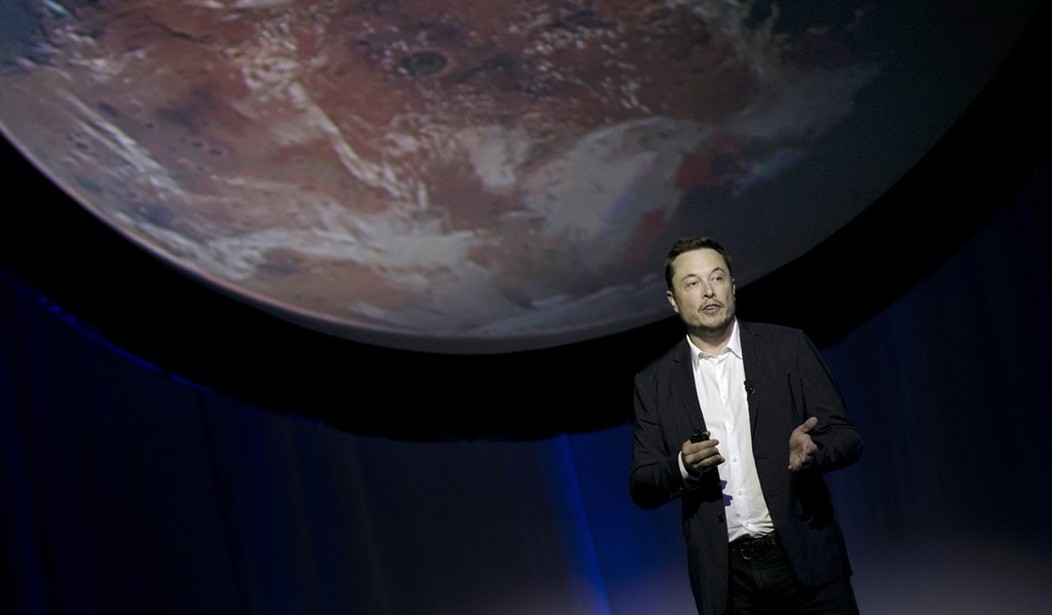This week, SpaceX has been working diligently to drum up media coverage for the unveiling of the "Falcon Heavy," its reusable, super heavy lift rocket that may be used for deep space missions. While the media narrative SpaceX is pushing might look appealing, federal appropriators should proceed with extreme caution.
SpaceX is advertising this rocket as "the most powerful operational rocket in the world by a factor of two." The company projects it has the potential to lift 119,000 pounds into space – twice the amount of the current leader. While the concept sounds good in theory, so have all the other broken assurances Musk has made in the past few years.
SpaceX says the Falcon Heavy will debut in January 2018, but in reality, who knows – it also said it would launch in 2013 or 2014, Spring of 2016, and late 2017. Earlier this year, SpaceX was estimated to have a $10 billion backlog of over 70 missions, and it continues to experience regular mission delays. The Falcon Heavy seems to be just another chapter in the textbook of the company's broken promises, and a long one at that.
Even Elon Musk, SpaceX's founder, doubts how successful the Falcon Heavy launch will be, saying, “I hope it makes it far enough away from the pad that it does not cause pad damage. I would consider even that a win, to be honest.” While that outlined scenario may be a step up from some of SpaceX's past failures, such as one in September 2016 that wrecked the Cape Canaveral launchpad and delayed NASA commercial flights to 2018, it is not exactly something taxpayers want to hear.
Recommended
Despite having such low hopes, Musk seems to be making a joke of the launch. On its first flight, he will have the Falcon Heavy send one of his Tesla Roadsters to the stars while David Bowie's "Space Oddity" plays in the background. This lack of seriousness over the event is concerning, especially because the Falcon Heavy is a rocket that it plans to use to send tourists around the Moon next year. Per SpaceX, customers have "already paid a significant deposit."
Unfortunately, SpaceX is devoting much of the energy it should be using to fix the Falcon Heavy on a new venture – the Big F—ng Rocket (BFR), a rocket that will supposedly be capable of doing everything its other lines can do while also having the ability to plant a colony on Mars. Musk has even gone so far as to say he believes the BFR will make the Falcon Heavy, as well as his other rocket lines, completely obsolete. SpaceX is targeting a 2022 BFR launch date.
For this reason alone, the government should think twice before giving the Falcon Heavy any contracts. After all, the Falcon 9, one of SpaceX's existing rocket lines, has been off to a bit of a rocky start. It has incited several costly explosions over the past few years, highlighting how new rocket lines need time to grow and mature. Why, then, would NASA give financial support to the Falcon Heavy – a rocket that has yet to get off the ground – when Musk is openly stating that he may shut it down soon?
Despite all of these concerns, the government could potentially give the Falcon Heavy more contracts than it deserves due to the government's adherence to Lowest Price Technically Acceptable (LPTA) appropriations standards. Currently, appropriators must provide contracts to the lowest bidder who submits a "technically acceptable" proposal. While this government mandate may work well for things like office supplies, it is not efficient for defense equipment due to important factors aside from cost, including reliability and durability.
In other words, "sticker price" is not always everything. SpaceX may low-ball a bid for Falcon Heavy launches – per its website, potentially even at a one-third discount – but appropriators should have every right to look at the "fine print" as well. The government should want to avoid another horrid situation like the Battle of Wanat in Afghanistan, where nine American soldiers died and dozens of others were wounded due to jammed-up, inefficient weapons. Low prices mean nothing without reliability.
Thankfully, a bipartisan solution to this problem has already been introduced in Congress. Rep. Mark Meadows (R-NC) released the Promoting Value Based Defense Procurement Act, a bill previously introduced by Rep. Donald Beyer (D-VA), which would allow the Department of Defense to circumvent this LPTA mandate when dealing with complex procurement scenarios.
Dreaming big is fine and should be encouraged; at the same time though, it should not be subsidized by the federal government. Here's hoping that this bill or one like it passes before any future short-sighted investments are made in Washington – the American taxpayers are counting on it.

























Join the conversation as a VIP Member